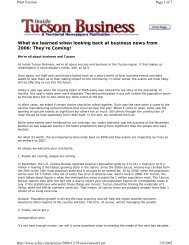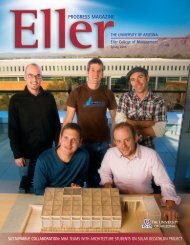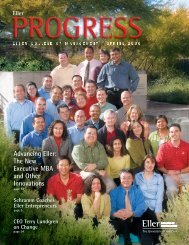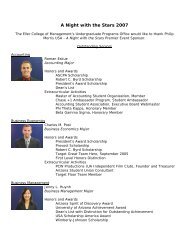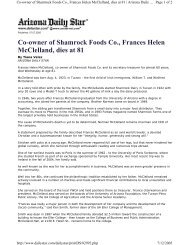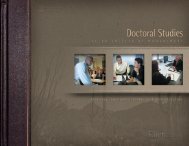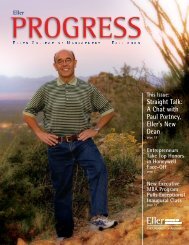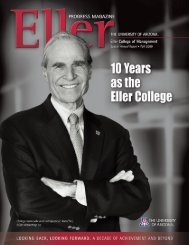Progress Magazine Annual Report 2011 - Eller College of ...
Progress Magazine Annual Report 2011 - Eller College of ...
Progress Magazine Annual Report 2011 - Eller College of ...
Create successful ePaper yourself
Turn your PDF publications into a flip-book with our unique Google optimized e-Paper software.
last word<br />
last word on<br />
the values-focused bottom line<br />
Howard Schultz<br />
Chairman, President, and CEO,<br />
Starbucks C<strong>of</strong>fee Company<br />
Howard Schultz is chairman,<br />
president, and chief executive<br />
<strong>of</strong>ficer <strong>of</strong> Starbucks C<strong>of</strong>fee<br />
Company. Schultz moved to<br />
Seattle from his native New York<br />
and joined the company in 1982<br />
as director <strong>of</strong> operations and<br />
marketing when Starbucks had<br />
only four stores. He has been<br />
recognized extensively for his<br />
passion, leadership, and efforts to<br />
strengthen communities, with<br />
honors including the Horatio Alger<br />
Award for those who have overcome<br />
adversity to achieve success<br />
and the Rev. Theodore M. Hesburgh<br />
Award for Business Ethics given by<br />
Notre Dame University’s Mendoza<br />
<strong>College</strong> <strong>of</strong> Business. He has also<br />
been included in Time magazine’s<br />
“Time 100,” a list <strong>of</strong> the most<br />
influential people in the world.<br />
On April 15, Howard Schultz<br />
addressed a crowd <strong>of</strong> close to<br />
500 students, faculty, Starbucks<br />
partners, and community<br />
members as the <strong>2011</strong> University<br />
<strong>of</strong> Arizona Executive <strong>of</strong> the Year.<br />
Schultz discussed the challenges<br />
<strong>of</strong> turning Starbucks around<br />
during the biggest economic crisis<br />
since the Great Depression – not<br />
by cutting back, but by returning<br />
to the company’s founding values.<br />
The following observations on<br />
trends in consumer<br />
behavior are excerpted<br />
from his<br />
talk; scan the QR<br />
code to watch the<br />
full talk online.<br />
32<br />
www.eller.arizona.edu n the university <strong>of</strong> arizona ®<br />
“Today we are witness to a<br />
seismic change in consumer<br />
behavior. As a company, we had<br />
to recognize that embracing the<br />
status quo as an operating principle<br />
was going to be a collision<br />
course with time and we had to<br />
adjust.”<br />
Now, there are three parallel<br />
dynamics going on in terms<br />
<strong>of</strong> this seismic change in the<br />
consumer behavior. The first<br />
is that the downturn in the<br />
economy is going to have a<br />
long tail. If suddenly we had<br />
five percent unemployment in<br />
America and small businesses<br />
had access to credit and<br />
everything was great, the<br />
economic downturn would still<br />
have a long-term effect on<br />
consumer behavior. What it<br />
means is that every company,<br />
small or large, consumer or<br />
otherwise, is going to have to<br />
establish a value proposition<br />
in order to create entry points<br />
for the customer.<br />
The second thing is the<br />
unbelievable way in which<br />
digital and social media are<br />
changing the rules <strong>of</strong><br />
engagement in how products,<br />
services, or any kind <strong>of</strong><br />
enterprise, are being marketed.<br />
What that means is that<br />
traditional marketing and<br />
traditional PR are just going<br />
to have to play a subordinate<br />
position to what is really<br />
going on. Every business, every<br />
enterprise, every organization,<br />
is going to have to create a<br />
discipline, an investment, and<br />
an enduring resource in<br />
understanding the seismic<br />
change in how people are<br />
gaining access to information<br />
and how they’re sharing it<br />
with others. One <strong>of</strong> the<br />
primary mistakes that<br />
companies are making is that<br />
they’re using these channels,<br />
or trying to use these<br />
channels, to sell stuff. It’s not<br />
there to sell stuff. It’s there to<br />
build trust and confidence<br />
Starbucks Photos<br />
with the customer so they<br />
can share it with others.<br />
The third issue is that<br />
consumers now have so<br />
much information about<br />
companies and products,<br />
coupled with the fact that<br />
we’re living at a time when<br />
there’s such competition<br />
and parity, that they are<br />
making buying decisions<br />
not only on what things<br />
cost, or the features and<br />
benefits <strong>of</strong> the product, or<br />
how convenient the<br />
location is. They’re making<br />
buying decisions on<br />
values, integrity, ethics,<br />
how you’re taking care <strong>of</strong><br />
your people. Customers<br />
want to support those<br />
companies and brands<br />
whose values are<br />
compatible with their own.<br />
This is not about a press<br />
release. This is not about<br />
marketing. This is about<br />
integrating a social<br />
conscience into every<br />
aspect <strong>of</strong> your business.<br />
It also is the primary way<br />
in which you’re going to<br />
attract and retain great<br />
people. They want to work<br />
for a company that they<br />
believe in and that they<br />
trust. They want to go<br />
home at night and share<br />
with their friends and their<br />
family that they’re working<br />
for a company that they’re<br />
proud to work for. “<br />
<strong>Eller</strong> <strong>College</strong> and Starbucks board member Olden Lee (<strong>Eller</strong> Management '68)<br />
and then-UA President Robert Shelton present Howard Schultz with the<br />
Executive <strong>of</strong> the Year Award.



